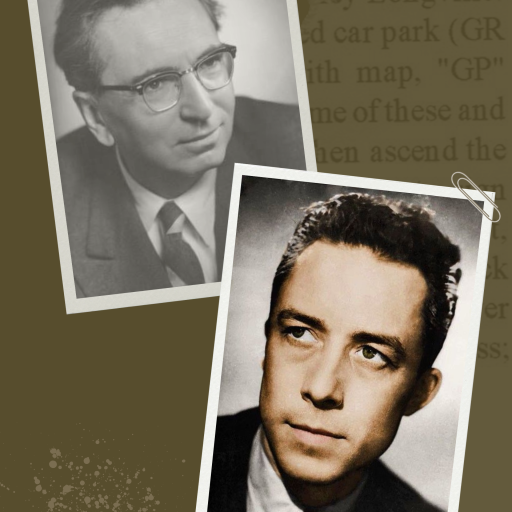Individual Agency and Pursuit of Purpose: Comparative Analysis of Victor Frankl’s and Albert Camus’s Perspectives
5 Ocak 2024Mariam Nauman
The essential theme of existentialist philosophy is the search for meaning in life, and philosophers like Albert Camus and Viktor Frankl have introspected to examine the nuances of individual agency and the pursuit of purpose. Their writings talk about the transformational arc of this search and give insight that may aid people in overcoming life’s complications and finding contentment. Exploring these concepts opens the door to a life-changing trail of self-discovery that empowers people to overcome hindrances and discover profound significance in their being.
So why is the meaning of life so crucial an idea in existentialism and philosophy as a whole? The need stems from the limits of human freedom, the burden of human responsibility, the undying need for authenticity, and the constant fight of existential dread. The answer is simple because the need to have a purpose is one of the base desires of the human soul. Philosophers ponder over how this purpose is acquired or understood or is worthwhile for the fulfillment of knowing who we are.
Camus uses the popular Greek myth of Sisyphus, a man doomed to push up a boulder for the rest of existence as a metaphor for the human condition and the undeniable absurdity of the universe. The strategy Camus provides in “An Absurd Reasoning, Absurdity and Suicide” (1946), is to find meaning in this absurdity. He describes the ‘absurd’ as something that arose from the contradiction of human desire for meaning and the indifference of the universe in the face of such wants. By acknowledging this, individuals can confront the challenges it presents and connect with life faithfully, overcoming the miseries of morality choosing not to commit suicide.
Camus then encourages people to rebel against the absurd, after acknowledging it. This defiant mindset asserts autonomy and refuses to accept the meaningless passivity life appears to offer. This revolt creates personal significance, leading one closer to finding purpose. Camus remarks about metaphysics, “The struggle itself toward the heights is enough to fill a man’s heart. One must imagine Sisyphus happy.” (p. 24) His next strategy to find the meaning of life is by living fully in the present. By engaging in life’s experiences with open arms, meaning can be found in the immediate and tangible aspects of existence. (p. 5) This perspective appreciates life’s beauty, feeling and happenings of each moment, giving an experience worthy to live for.
One has the freedom to choose, act, and create their own values which means they can live alive based on their own aspirations and desires. He suggests that there is joy in struggling and the act of rebelling against the absurd can create happiness and satisfaction. “I draw from the absurd three consequences: my revolt, my freedom, and my passion.” (p. 22)
Other than absurdism under the guise of existentialism; nihilism, stoicism and humanism can be seen in his teachings. The emphasis on the inherent meaninglessness can be taken as nihilist but he diverges by telling to find meaning in rebellion, authenticity, and how the search for meaning can give meaning itself. Stoicism can be seen in the need to seek inner peace, choosing your reaction in the face of something difficult. Camus’s quest for personal meaning can be seen as a humanistic response highlighting human agency even in an absurd universe, showing how crucial it is.
Coming on to our next philosopher, Frankl, a Holocaust survivor, uses his experience to advocate that despite suffering there is purpose to be found in this world. This is what ‘tragic optimism’ is, the idea that acknowledges all things painful and says that one can choose their attitude and response to any pain. In Man’s Search for Meaning, “The Case for a Tragic Optimism” (1946), there are strategies for one’s search for meaning. He says that this is an innate driving force that can shape one’s actions and overall, well-being, and this search can give people purpose.
According to Frankl, setting precise goals provides people with a feeling of direction and something to work for, whether they are artistic, professional, or personal. He insists on the phenomenological importance of a strong feeling of meaning and purpose being enhanced through nurturing connections, exhibiting compassion and kindness, and encouraging a sense of belonging.
Frankl believed finding meaning involves transcending oneself and devoting oneself to something bigger than oneself. People may develop a sense of presence, gratitude, and engagement with life by living in the now and enjoying the chances and experiences present.
Frankl established the therapeutic strategy known as logotherapy, which accentuates the need of meaning seeking as a fundamental aspect of psychological health. His approach to discover purpose under the most difficult circumstances is a clear example of the stoic virtue of tolerating hardship while being resilient. Transcendentalism can be seen in his exploration of meaning beyond the present and his focus on instead the spiritual side of life.
Both Camus and Frankl subvert and contest contemporary theories on creating meaning. Camus criticizes the ideologies, philosophies, and religious systems that aim to offer concrete ideas to accomplish satisfaction. (p. 12) He believed creating a lofty narrative or overarching meaning for life inevitably results in a sense of disenchantment and bleakness in the face of the absurdity of life. Frankl argued that finding genuine fulfillment comes from linking one’s actions with a bigger sense of meaning, even while worldly concerns and ambitions may momentarily satisfy or serve as diversions, self-gratification, or the hunt of hedonistic choices. (p. 176) He suggested that these supplementary activities frequently produce a hollow and flimsy sense of significance, leaving people feeling unfulfilled. The notion that meaning can only come from outside sources, such cultural hopes, financial prosperity, or fleeting pleasures, is disputed by both. They support a more introspective and existential examination of meaning that is based on the person’s specific experiences and decisions.
The idea of absurdity, however, is approached differently by them. Frankl argues that absurdity may be surpassed and that it is possible to discover meaning within it, whereas Camus views absurdity as an intrinsic and unavoidable feature of reality. Frankl leans more toward acceptance and making decisions in line with one’s values, whereas Camus places greater stress on revolt against the absurd and claiming personal independence. Frankl mentions love, employment, and finding worth in suffering as potential paths to meaning, but Camus does not identify any specific sources of meaning. Frankl strongly leans on his individual experiences as a Holocaust survivor, whereas Camus adopts a more academic and philosophical stance.
Both Viktor Frankl and Albert Camus’s writings examine the purpose of life and display existentialist undertones. Both discuss the underlying absurdity and meaninglessness of existence, with Frankl recommending that meaning may be discovered via individual decisions, attitudes, and exchanges with others and Camus challenging the notion of an objective meaning. Both examine how people look for personal meaning, with Camus arguing that people may create their own subjective meaning via their acts and attitudes and Frankl emphasizes this too.
While discussing existentialist principles we can mention the writings of Jean-Paul Sartre, often considered as the father of existentialism. He resonates with Camus and Frankl’s views on the significance of personal choice, responsibility, and meaning seeking. Sartre’s claim that existence comes before essence is in line with Camus’s rejection of objective meaning and his belief that each person must choose their own purpose. Sartre’s existential beliefs are also consistent with Frankl’s focus on individual accountability and the choice to choose one’s outlook in the face of pain.
In my opinion, I prefer Camus and Frankl to other philosophers because of their practical approach in enhancing the individual’s happiness. Unlike others they offer clear solutions to understand and sustain life. I think one of the more realistic subfields of existentialism is absurdism, and some of the burden of discovering one’s unique purpose is decreased through this. Frankl’s stoicism about having a choice in how you respond to adversity has also offered me advice on how to live a more satisfying life. I also like how Frankl attempted to answer the ethical gap in philosophers encouraging people to find their purpose, what if they choose to become evil? “Freedom, however, is not the last word. Freedom is only part of the story and half of the truth. Freedom is but the negative aspect of the whole phenomenon whose positive aspect is responsibleness.” (p. 155-156) He argues that there is accountability; we have to be cordial to the people around us to inspire better living for both parties.
In conclusion, the writings of Frankl and Camus illuminate the existentialist quest for the purpose of life. Camus tasks people to confront the absurdity of existence, fight against it, and generate meaning by being true to yourself. On the other side, Frankl places a strong weight on individual responsibility, the pursuit of meaning, and the power of attitude in the face of adversity. Both advocate the worth of individual choice, the chase for ideals, and accepting the worries of life. In the end, realizing one’s own individual meaning in life entails thought, self-awareness, and a willingness to deal with its intricacies.
References:
Frankl, V. (1946). Man’s Search for Meaning.
Camus, A. (1942, October). The Myth of Sisyphus.

